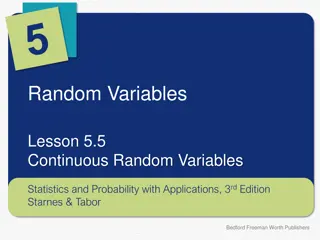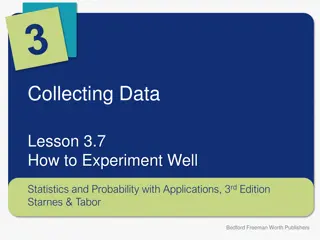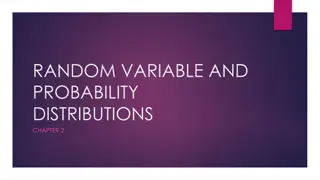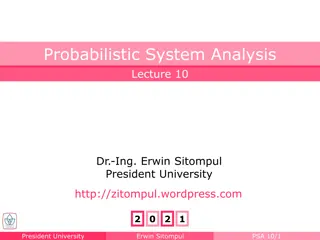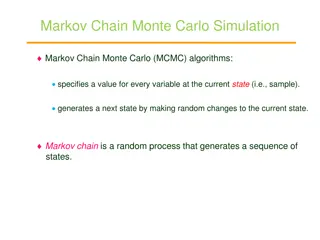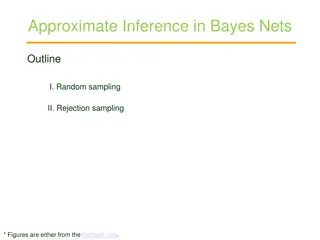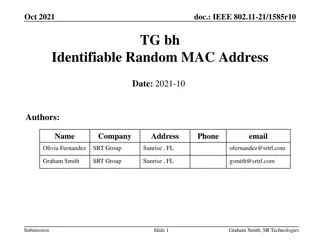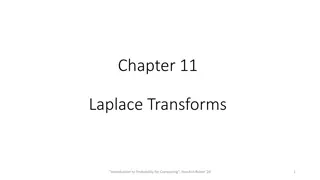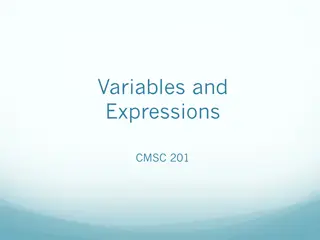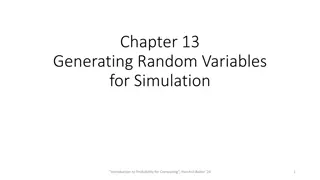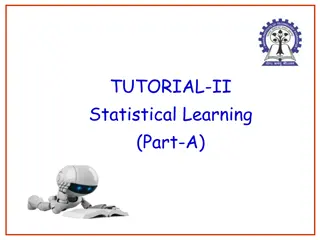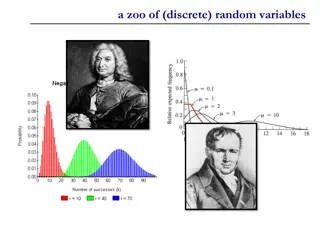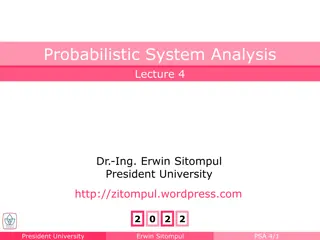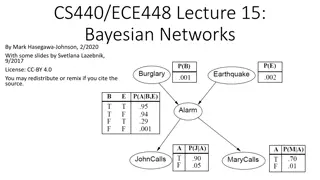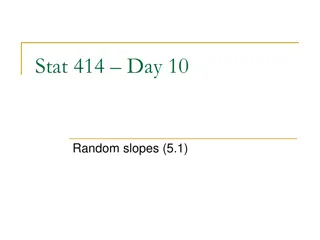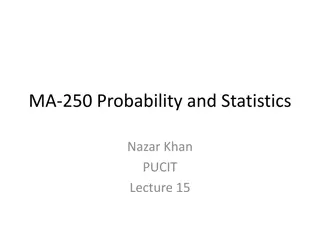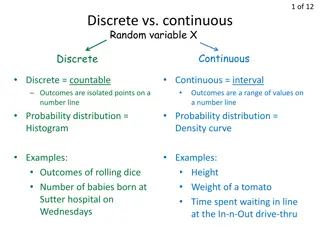Understanding Dummy Variables in Regression Analysis
Dummy variables are essential in regression analysis to quantify qualitative variables that influence the dependent variable. They represent attributes like gender, education level, or region with binary values (0 or 1). Econometricians use dummy variables as proxies for unmeasurable factors. These
3 views • 19 slides
Understanding Variables in Research Studies
Variables in research studies play crucial roles in examining relationships and drawing conclusions. They include independent variables that influence outcomes, dependent variables affected by independent ones, moderator variables that strengthen or weaken relationships, intervening variables lying
7 views • 34 slides
Understanding Variables and Control in Research Design
In research design, variables play crucial roles as either dependent or independent factors, with extraneous variables potentially affecting study outcomes. Controlling for extraneous variables is essential to attribute effects solely to the independent variables. Research hypotheses aim to test pre
0 views • 6 slides
Proposal for Random Access Efficiency Enhancement in IEEE 802.11be Networks
This document presents a proposal for enhancing random access efficiency in IEEE 802.11be networks through a Random-Access NFRP (RA-NFRP) principle. The proposal addresses the challenges of low efficiency in the current UORA procedure and introduces modifications based on the 802.11ax standard to im
5 views • 16 slides
Understanding Continuous Random Variables in Statistics
Learn about continuous random variables in statistics, where we analyze the probability distribution of variables to calculate probabilities, determine mean and median locations, and draw normal probability distributions. Explore examples like ITBS scores and enemy appearance in video games to under
0 views • 16 slides
Understanding Bluetooth Low Energy Addresses in IEEE 802.11-21/1535r0
The document explores the features of resolvable addresses in Bluetooth Low Energy (BLE) within the IEEE 802.11-21/1535r0 standard. It discusses the two types of addresses in BLE, Public and Random, and their usage. The emphasis is on Random addresses due to their popularity and privacy features. Th
2 views • 11 slides
Understanding Variable Declarations and Conversions in Java
Properly declaring variables in Java is essential before using them. This chapter covers different types of variable declarations, including class variables, instance variables, local variables, and parameter variables. It also explains the concept of type casting and the importance of explicitly de
1 views • 23 slides
Understanding Random Forests: A Comprehensive Overview
Random Forests, a popular ensemble learning technique, utilize the wisdom of the crowd and diversification to improve prediction accuracy. This method involves building multiple decision trees in randomly selected subspaces of the feature space. By combining the predictions of these trees through a
1 views • 21 slides
Simplifying Random Assignment with The Cambridge Randomizer
The Cambridge Randomizer offers a cost-effective and efficient solution for random assignment in research studies, enabling treatment providers to conduct the process securely. This innovative online portal streamlines the assessment of participant eligibility, provides instant baseline data, and en
0 views • 8 slides
High-Throughput True Random Number Generation Using QUAC-TRNG
DRAM-based QUAC-TRNG provides high-throughput and low-latency true random number generation by utilizing commodity DRAM devices. By employing Quadruple Row Activation (QUAC), this method outperforms existing TRNGs, achieving a 15.08x improvement in throughput and passing all 15 NIST randomness tests
0 views • 10 slides
Understanding Random Variables and Their Applications in Various Fields
Random variables play a crucial role in statistics, engineering, and business applications. They can be discrete or continuous, depending on the nature of the outcomes. Discrete random variables have countable values, while continuous random variables can take on any real number. This article explor
0 views • 6 slides
Understanding Random Assignment in Experiments
Explore the importance of random assignment in conducting experiments effectively. Learn how to assign treatments randomly using methods like slips of paper or technology, ensuring equivalent groups and minimizing confounding variables. Discover the significance of random assignment in maintaining r
0 views • 11 slides
Understanding Variables in Educational Research
Variables in educational research play a crucial role as symbols of events, traits, or characteristics that can be measured and categorized. Different types of variables such as change, effect, and outcome variables are essential in studying causal relationships. Dependent variables represent outcom
6 views • 17 slides
Understanding Random Variables and Probability Distributions
Random variables are variables whose values are unknown and can be discrete or continuous. Probability distributions provide the likelihood of outcomes in a random experiment. Learn how random variables are used in quantifying outcomes and differentiating from algebraic variables. Explore types of r
0 views • 13 slides
Advanced Imputation Methods for Missing Prices in PPI Survey
Explore the innovative techniques for handling missing prices in the Producer Price Index (PPI) survey conducted by the U.S. Bureau of Labor Statistics. The article delves into different imputation methods such as Cell Mean Imputation, Random Forest, Amelia, MICE Predictive Mean Matching, MI Predict
0 views • 22 slides
Understanding Variables in Physics: A Comprehensive Guide
This presentation introduces and explains different types of variables in Physics, emphasizing the concepts of independent, dependent, and control variables. It provides practical examples and tips for identifying variables in experiments, aiming to enhance students' understanding of scientific meth
2 views • 24 slides
Understanding Random Class in Java Programming
The Random class in Java is used to generate pseudo-random numbers. By utilizing methods such as nextInt and nextDouble, you can generate random integers and real numbers within specified ranges. This chapter explores common usage scenarios, such as generating random numbers between specific ranges
2 views • 10 slides
Understanding Random Sampling in Probabilistic System Analysis
In the field of statistical inference, random sampling plays a crucial role in drawing conclusions about populations based on representative samples. This lecture by Dr. Erwin Sitompul at President University delves into the concepts of sampling distributions, unbiased sampling procedures, and impor
0 views • 23 slides
Kaseya Fundamentals Workshop - Agent Procedures and Variables Overview
Discover the key aspects of Agent Procedures and Variables in Kaseya Fundamentals Workshop, including Managed Variables, Global Variables, and Public Variables. Explore examples of Agent Procedures and learn about Application Deployment, Windows Registry Modification, and more. Gain insights into Pr
0 views • 23 slides
Quantum Key Agreements and Random Oracles
This academic paper explores the impossibility of achieving key agreements using quantum random oracles, discussing the challenges and limitations in quantum communication, cryptographic protocols, quantum computation, and classical communication. The study delves into the implications of quantum ra
0 views • 29 slides
Understanding MCMC Algorithms and Gibbs Sampling in Markov Chain Monte Carlo Simulations
Markov Chain Monte Carlo (MCMC) algorithms play a crucial role in generating sequences of states for various applications. One popular MCMC method, Gibbs Sampling, is particularly useful for Bayesian networks, allowing the random sampling of variables based on probability distributions. This process
1 views • 7 slides
Approximate Inference in Bayes Nets: Random vs. Rejection Sampling
Approximate inference methods in Bayes nets, such as random and rejection sampling, utilize Monte Carlo algorithms for stochastic sampling to estimate complex probabilities. Random sampling involves sampling in topological order, while rejection sampling generates samples from hard-to-sample distrib
0 views • 9 slides
Understanding Joint Densities and Probability for Continuous Random Variables
Explore the concepts of joint densities and probability for continuous random variables through examples like meeting times, electrical components' lifetimes, and marginal densities in various scenarios. Learn to calculate probabilities, verify density functions, find joint CDFs, and analyze random
0 views • 18 slides
Understanding Random Numbers in Computers
Explore the concept of true random numbers versus pseudorandom numbers in computers. Learn how pseudorandom numbers are generated algorithmically but predictable, while true random numbers are derived from physical phenomena like radioactive decay. Discover the relevance of high-entropy pseudorandom
0 views • 57 slides
IEEE 802.11-21/1585r10: Identifiable Random MAC Address Presentation Summary
This presentation discusses the concept of Identifiable Random MAC (IRM) addresses in the IEEE 802.11-21/1585r10 standard. It covers the purpose of IRM addresses in preventing third-party tracking while allowing trusted parties to identify specific devices. The presentation outlines the use of Ident
0 views • 24 slides
Understanding Random Variables and Probability Distributions
Random variables play a crucial role in statistics, representing outcomes of chance events. This content delves into discrete and continuous random variables, probability distributions, notation, and examples. It highlights how these concepts are used to analyze data and make predictions, emphasizin
0 views • 25 slides
Understanding Laplace Transforms for Continuous Random Variables
The Laplace transform is introduced as a generating function for common continuous random variables, complementing the z-transform for discrete ones. By using the Laplace transform, complex evaluations become simplified, making it easy to analyze different types of transforms. The transform of a con
0 views • 17 slides
Introduction to Variables and Expressions in Python
Today we start Python! Learn about variables, how to create them, assign values, and perform mathematical operations using variables in Python. Understand the rules for naming variables and how they are essential for storing and managing information in your programs. Explore different types of varia
0 views • 16 slides
Understanding Variables in Economics
Variables in economics, such as dependent, independent, endogenous, and exogenous variables, play a crucial role in analyzing economic phenomena. Dependent variables are influenced by changes in other variables, while independent variables are not. Endogenous variables are internal and need to be pr
0 views • 8 slides
Generating Random Variables Using Inverse Transform Method
Explore the Inverse Transform Method for generating random variables in simulations. Learn how to map random instances to desired distributions, whether continuous or discrete, by understanding cumulative distribution functions and inverting them. Examples and step-by-step explanations provided for
0 views • 24 slides
Understanding Random Variables and Probability Distributions
Explore the concept of random variables, differentiate between discrete and continuous variables, understand probability distributions, and calculate probabilities for events using properties of random variables. Dive into examples and probability histograms to grasp key principles.
0 views • 39 slides
Understanding Discrete Random Variables and Variance Relationships
Explore the concepts of independence in random variables, shifting variances, and facts about variance in the context of discrete random variables. Learn about key relationships such as Var(X + Y) = Var(X) + Var(Y) and discover common patterns in the Discrete Random Variable Zoo. Embrace the goal of
0 views • 27 slides
Statistical Learning: Discrete Random Variables and Distributions
Explore the concepts related to discrete random variables and their corresponding probability density functions, such as Poisson Distribution and Binomial Distribution. Understand the implications of negative values in random variables, calculate expected values, and grasp the relationships between
0 views • 16 slides
GUC-Secure Commitments via Random Oracles: New Findings
Exploring the feasibility of GUC-secure commitments using global random oracles, this research delves into the differences between local and global random oracles, outlining motivations and future work. It discusses UC frameworks, zero-knowledge proofs, oblivious transfers, and the GUC framework for
0 views • 18 slides
Understanding a Zoo of Discrete Random Variables
Discrete random variables play a crucial role in probability theory and statistics. This content explores three key types: Bernoulli random variable, binomial random variable, and error-correcting codes. From understanding the basics of Bernoulli trials to exploring the application of error correcti
0 views • 27 slides
Understanding Probabilistic System Analysis with Dr. Erwin Sitompul
Explore an in-depth discussion on probabilistic system analysis in these lectures by Dr. Erwin Sitompul from President University. Topics include random variables, probability distributions, mathematical expectation, and more. Gain insights into calculating probabilities and expected values for cont
0 views • 17 slides
Understanding Bayesian Networks for Efficient Probabilistic Inference
Bayesian networks, also known as graphical models, provide a compact and efficient way to represent complex joint probability distributions involving hidden variables. By depicting conditional independence relationships between random variables in a graph, Bayesian networks facilitate Bayesian infer
0 views • 33 slides
Understanding Random Slopes in Data Analysis
Exploring the impact of grand-mean and group-mean centering on intercept interpretation with random slopes, as well as variations in slope/intercept covariance. Differentiating between fixed and random coefficients, and the effects of adding group mean as a Level 2 variable. Delving into within vs.
0 views • 21 slides
Understanding Random Variables in Probability and Statistics
Explore the concept of random variables in probability and statistics, including discrete and continuous types. Learn how to assign values to outcomes, calculate probabilities, and understand density functions. Dive into examples like coin toss outcomes and dice roll sums to grasp the application of
0 views • 34 slides
Understanding Random Variables and Mean in Statistics
Random variables can be discrete or continuous, with outcomes represented as isolated points or intervals. The Law of Large Numbers shows how the mean of observed values approaches the population mean as the number of trials increases. Calculating the mean of a random variable involves finding the e
0 views • 13 slides




